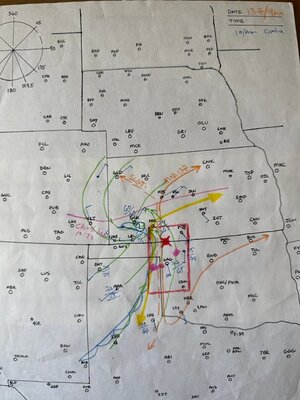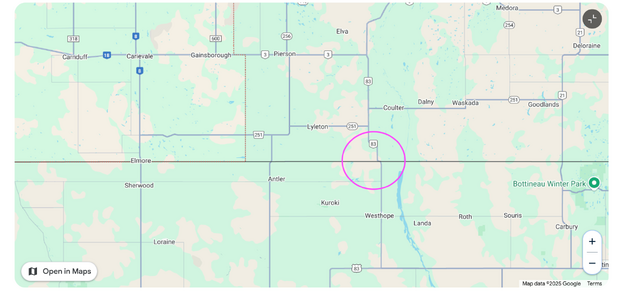Forwarded and posted to StormTrack Online with Randy's permission, here are some e x t e n d e d memories about Chuck from fellow University of Oklahoma and NSSL meteorologist Randy Zipser from Florida.
Enjoy!
Blake
+++++++++
For everyone who has played any part in Chuck’s extraordinary life, they will certainly have many, many stories and reminiscences to share. The outpouring of stories in Storm Track Online, for example, shows just how much Chuck touched so many lives, evoking a gamut of human emotions.
During the early- to mid-1970s, I had the great fortune to work along side some of the best-and-brightest severe-storm research meteorologists in the world. It was during this period of my life, a young lad in my early twenties, that I first met Charles Doswell III. I referred to him as “Chuck,” a nickname which, as I now recall, he chided me for using. At that time, I was an OU Department of Meteorology master’s-degree student intern at the National Severe Storms Laboratory (NSSL) in Norman, under the tutelage of Dr. Joseph Golden. Dr. Golden’s research was involved with the photogrammetric determination of tornado windspeeds near the ground. Chuck Doswell, who was commencing his doctoral degree research, occupied a standard governmental-sized cubicle in the main room on the second floor at NSSL near Dr. Golden’s office, near where I would be working. Since our research projects were along entirely different paths, I had only very infrequent encounters with Chuck, although his work cubicle was the very first one on the left as one entered the main room. It was hard not to see Chuck on any given day, and what I fondly remember was the view of Chuck sitting in his chair, with back tilted and feet propped up over the front edge of his desk, studiously pouring over a document or meteorological journal. Chuck was a prodigious reader, absorbing knowledge like some super-human vacuum cleaner! In that regard, I recall thinking that he was model example of what a severe-storm research meteorologist should look like.
At the time, being so young, I was a bit unsure about how I could fit in with the other more-experienced researchers at the Lab. Chuck, who had a very keen sense about “reading” people, playfully exploited this perceived weakness in me. In those early days at the Lab, I recall feeling as if I could never quite figure out just what he was thinking during those rare moments when we did discuss anything, but I, nonetheless, admired what I saw in him. Looking back, I really regret that I did not get to know him better during that period of my life.
It is funny, again in hindsight, what one does remember about those brief years of our encounter at the Lab. I do not recall doing too many storm-chases with Chuck, although I’m sure there were a few, the Union City, OK, tornado event on May 24, 1973, being the most memorable for me, but more due to fellow storm-chaser Alan Moller than to Chuck Doswell. However, in the spring of 1976, Chuck and I were both finishing up our graduate studies, and Chuck’s dissertation and my thesis defense meetings were scheduled for about the same time. At NSSL at that time, Ms. Carol Cunningham, who was the principal office assistant for NSSL-Director Dr. Edwin Kessler, was busy typing Chuck’s dissertation document and, at the last minute, I was bumped off her schedule. I found myself in a very uncomfortable position of not being ready to present my thesis document to Dr. Golden and thesis committee (which, as it turned out, included the late Dr. Jeff Kimpel, who succeeded Dr. Kessler as NSSL director upon Ed’s retirement). To my great relief, however, Ms. Evelyn Horowitz, who was another office assistant at NSSL, graciously offered to help me, and in fact, worked tirelessly with me through the entire night typing my thesis and attaching the illustrations, tables, and figures. Due to Evelyn’s Herculean efforts, my thesis was ready a mere three hours before my thesis committee appearance. All ended up fine for both Chuck and me, as Carol took care of Chuck’s situation and Evelyn heroically “saved the day” for me, but I could not help but to feel embittered at the time. Of course, that entire experience was not Chuck’s fault and I had no reason to blame him, but I confess to the distressful feeling I had at the time. After finishing my education, I left NSSL and went on to other fulfilling career pursuits. Chuck, however, remained in the severe-storm research community in Norman, to become a very esteemed and peer-respected severe-storm and tornado expert. As if by God’s Plan, Chuck’s career in and contribution to meteorology far outshined any contribution I ever made in that field of endeavor. To this day, I join many who knew him in humbly stating that Chuck is deserving of praise and recognition for his professional accomplishments.
Some years later, in 2014, I was considering attending the ChaserCon in Norman. I had contacted one of the ChaserCon organizers about whether I could arrange to get a tour of the World Weather Center, and especially to see some of my “old’ friends from my NSSL days who were working there. Somehow, that request got to Chuck, who responded, “Randy, you haven’t changed a bit over the years—you’ve always been so hard on yourself! You don’t need a special invitation to come here…because you’re one of us. You’ve made it and have nothing to prove [to, presumably, gain our acceptance]! Wow! Hearing those words from Chuck was enormously important and satisfying to me: I had finally gained relevance among the meteorological community of peers that I thought I had failed to achieve earlier in my life—I’d finally “come full circle.”! I will always be grateful to Chuck Doswell for vocalizing those words to me in private; to this day, I have never forgotten just how gratifying and uplifting those words were to me.
One closing, but important, observation about Chuck Doswell. Chuck was a very complex individual having multi-faceted interests…from mesocyclones to music to muscle cars. I found that he was not a really “easy” person to truly know. Although Chuck’s numerous professional contributions are told across the pages of JAS, JAM, MWR, and Weatherwise, his real legacy is that he was a great teacher about life for those who knew him…and I realized this only many years after my encounters with him. I had the sense that Chuck kept many of his most inner thoughts “close to his vest,” but he had a remarkable sense of “reading” people—“sizing them up”—and more often than not, his intuition proved to be “spot on.” That was certainly the case for me.
He will be missed. My prayers go out to Vickie and his daughter.
Randal Zipser
January 19, 2025

![STORM TALK by Tim Marshall [1995] Image 1.jpg](/data/attachments/43/43574-f78019eaa889c6523742110ff68a5e45.jpg?hash=ka52sayrMs)
![STORM TALK by Tim Marshall [1995] Image 2.jpg](/data/attachments/43/43575-acbe7771df694eb3f0a1214396f185ec.jpg?hash=L7Bsw5KSEM)
![STORM TALK by Tim Marshall [1995] Image 3.jpg](/data/attachments/43/43576-29a3f90842d43755d11f39f2131771b8.jpg?hash=O8wAePHOoI)
![STORM TALK by Tim Marshall [1995] Image 4.jpg](/data/attachments/43/43577-fff192decd804ca2b4473cdc0ef48f18.jpg?hash=bVwqUVRAx6)

